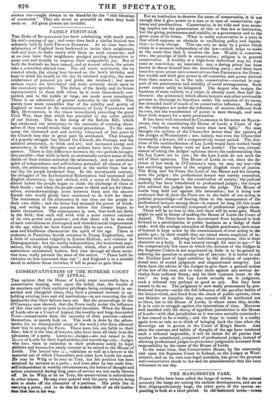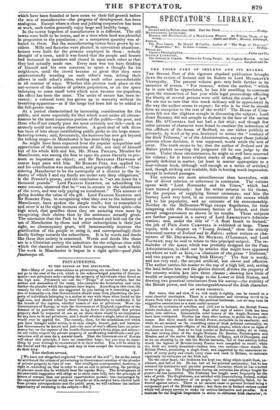THE MANCHESTER PARK.
Prussic Parks have been called the lungs of towns. In the animal economy the lungs are among the earliest developments, and are at first disproportionately large, the other parts of the system ex- panding in bulk at a later period. In old-fashioned towns—towns
which have been founded or have come to their full growth before the tem of manufactures—the progress of development has been analogous. Except where a close and jobbing corporation has been at work, such towns generally enjoy large and healthy lungs. In the towns begotten of manufactures it is different. The old towns were built to be towns, and at a time when land was plentiful in proportion to the population ; so a competent quantity was al- lotted to them. But the manufacturing-towns have grown by ac- cident. Mills and factories were planted in convenient situations; houses were built for the persons employed in them : nobody thought of a town, until it was found that the people and houses had increased in numbers and closed in upon each other so that they had actually made one. Every man was too busy thinking of himself and his own concerns to spare a thought for his neighbours, until the crowd became so great that they were unintentionally treading on each other's toes, driving their elbows in each other's sides, making each other uncomfortable in all manner of ways. Whether this process took place on the out-corners of the estates of private proprietors, or on the space belonging to some small town which soon became too populous, the effect has been the same. The order of nature has been in- verted: a colossal town has grown up to maturity without its breathing-apparatus—as if the lungs had been left to be added to the full-grown man. At a period characterized by increasing consideration for the public, and more especially for that which must under all circum- stances be the most numerous portion of the public—the poor, and those who if not exactly poor are most certainly not rich—such an anomaly could not escape observation. A good deal of talk there has been of late about establishing public parks in the large manu- facturing-towns; and, fortunately, the business has now got beyond the talking stage—in Manchester it has been fairly begun.
As might have been expected from the popular sympathies and appretiation of the innocent amenities of life, not only of himself but of his whole kith and kin, Mr. MARK PHILIPS, Member for Manchester, was among the first to open his purse liberally to pro- mote so important an object; and Sir BENJAMIN HEYWOOD of course kept pace with him. Sir ROBERT PEEL was applied to ; and his contribution was munificent, and gracefully offered : "Con- sidering Manchester to be the metropolis of a district to the in- dustry of which I and my family are under very deep obligations," is the Premier's proem, and the conclusion is "set me down for a thousand pounds." Lord FRANCIS EGERTON, on subscribing the same amount, observed that he "was in arrears to the inhabitants of the town, and was only paying an instalment." This manner of giving doubles the value of the gift. Lord FRANCIS EGERTON and Sir ROBERT PEEL, in recognizing what they owe to the industry of Manchester, have spoken the simple truth ; but to remember it and utter it at the right moment shows the wise liberal spirit—the high mind, that gratifies those they are assisting even more by recognizing their claims than by the assistance actually given. The admission that the Park to be purchased and laid out for the use of Manchester by those and other subscriptions is their just right, no eleemosynary grant, will immeasurably increase the gratification of the people in using it, and correspondingly their kindly feelings towards the subscribers. It is by words and deeds like these that society is cemented. Words and deeds like these are in a Christian society the substitute for the religious rites with which the classical nations would have inaugurated such a field. The work in Manchester is begun in a right spirit—quad fells faustumque sit



























 Previous page
Previous page